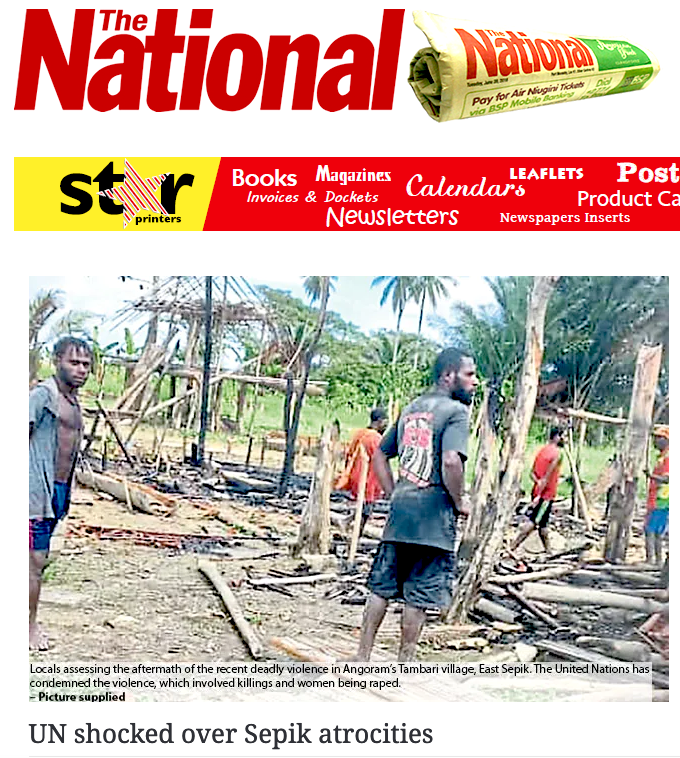RNZ Pacific and ABC
Violent attacks on three remote villages in Papua New Guinea’s north have reportedly killed 26 people, including 16 children, while several people were forced to flee after attackers set fire to their homes, the United Nations said.
“I am horrified by the shocking eruption of deadly violence in Papua New Guinea, seemingly as the result of a dispute over land and lake ownership and user rights,” UN Human Rights chief Volker Turk said in a statement.
The death toll could rise to more than 50 as PNG authorities search for missing people, Turk said.
Provincial Police Commander in East Sepik James Baugen said: “It was a very terrible thing, when I approached the area, I saw that there were children, men, women. They were killed by a group of 30 men.”
He told the ABC that all the houses in the village were burned, and the remaining villagers were sheltering at a police station, too scared to name the perpetrators.
“Some of the bodies left in the night were taken by crocodiles into the swamp. We only saw the place where they were killed, there were heads chopped off,” he said.
“The men are in hiding, police have been deployed but there have been no arrests yet.”
Turk called on PNG authorities “to conduct prompt, impartial and transparent investigations and to ensure those responsible are held to account”.
Impunity for criminals
Governor Allan Bird of East Sepik, where the murders occurred, said the violence in the country had been getting worse during the past 10 years.
“The lack of justice in PNG is a problem, and it is getting worse,” he told the ABC.

“Over the last 10 years or so, if a crime is committed, investigations hardly result in arrest. Even if they are arrested, it’s difficult to go to court and go to jail. That is giving law-breakers more courage to do the wrong thing,” he said.
Advocating for stronger police enforcement and stronger prosecution mechanisms, he said there would be a reduction in crime when people started going to jail.
He told the ABC that the police force had had a long-standing problem with command and control.
“The head of police here, for some reason, is constantly changing. It’s a three-year contract, but they keep changing every six months, 12 months,” he said.
“They removed our provincial police commander in January and there’s no replacement even today.”
Tribal warfare exacerbated
Home to hundreds of tribes and languages, Papua New Guinea has a long history of tribal warfare.
But an influx of mercenaries and automatic weapons has inflamed the cycle of violence.
During the past decade, villagers swapped bows and arrows for military rifles and elections have deepened existing tribal divides.
At the same time, the country’s population has more than doubled since 1980, placing increasing strain on land and resources, and stoking deepening tribal rivalries.
Eight people were killed and 30 homes torched in fighting in the Enga province in May, while at least 26 men were killed in an ambush in the same region in February.
This article is republished under a community partnership agreement with RNZ and permission from ABC.
This content originally appeared on Asia Pacific Report and was authored by APR editor.
APR editor | Radio Free (2024-07-25T21:41:41+00:00) UN shocked over beheadings, burnt village in brutal PNG violence. Retrieved from https://www.radiofree.org/2024/07/25/un-shocked-over-beheadings-burnt-village-in-brutal-png-violence/
Please log in to upload a file.
There are no updates yet.
Click the Upload button above to add an update.